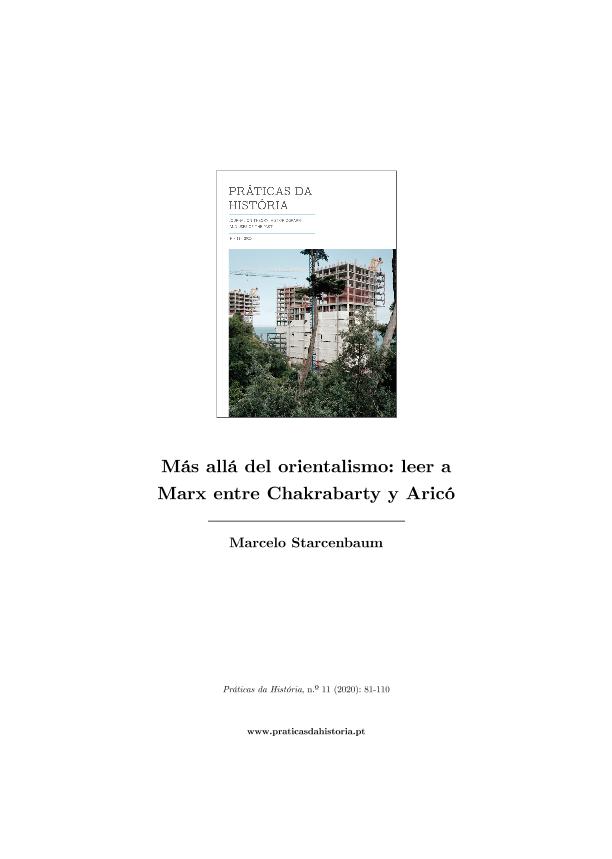Mostrar el registro sencillo del ítem
dc.contributor.author
Starcenbaum, Marcelo

dc.date.available
2022-04-13T17:34:39Z
dc.date.issued
2020-12
dc.identifier.citation
Starcenbaum, Marcelo; Más allá del orientalismo: Leer a Marx entre Chakrabarty y Aricó; Universidade Nova de Lisboa; Práticas Da História; 11; 12-2020; 81-100
dc.identifier.issn
2183-590X
dc.identifier.uri
http://hdl.handle.net/11336/155223
dc.description.abstract
Beyond the differences between the intellectual and political practices of Dipesh Chakrabarty and José Aricó, the work of both authors represent a common way of intervening in the discussion about Marx’s Orientalism. Simultaneously with Said’s work and the debates generated by it, the Indian historian and the Argentine intellectual developed a reading of Marx focused on the ambivalences of the German thinker regarding non-European societies. Differentiated from the hypothesis of a necessary Eurocentrism in the configuration of Marxist theory, the two authors endeavored to demonstrate the need for Marxist concepts to account for peripheral realities. In the case of Chakrabarty, rescuing the narrative of capital but opening the Marxist corpus to the problem of historical difference. In the case of Aricó, destabilizing the Marxist tradition through the recovery of a Marx interested in the specificities of non-European societies. Through these operations, Chakrabarty and Aricó developed a critical movement within Marxism that involved maintaining a materialistic position but also opening up to national and regional singularities.
dc.description.abstract
Além das diferenças entre as práticas intelectuais e políticas de Dipesh Chakrabarty e José Aricó, o trabalho de ambos os autores representa uma maneira comum de intervir na discussão sobre o orientalismo de Marx. Simultaneamente ao trabalho de Said e aos debates gerados por ele, o historiador indiano e o intelectual argentino desenvolveram uma leitura de Marx focada nas ambivalências do pensador alemão em relação às sociedades não europeias. Diferenciados da hipótese de um eurocentrismo necessário na configuração da teoria marxista, os dois autores fizeram um esforço para demonstrar a necessidade de ter conceitos marxistas para dar conta das realidades periféricas. No caso de Chakrabarty, resgatando a narrativa do capital, mas abrindo o corpus marxista ao problema da diferença histórica. No caso de Aricó, desestabilizando a tradição marxista através da recuperação de um Marx interessado nas especificidades das sociedades não europeias. Através dessas operações, Chakrabarty e Aricó desenvolveram um movimento crítico dentro do marxismo que envolveu a manutenção de uma posição materialista, mas também a abertura a singularidades nacionais e regionais. Palavras-chave: Dipesh Chakrabarty, José Aricó, Marxismo, Orientalismo.
dc.description.abstract
Beyond the differences between the intellectual and political practices of Dipesh Chakrabarty and José Aricó, the work of both authors represent a common way of intervening in the discussion about Marx’s Orientalism. Simultaneously with Said’s work and the debates generated by it, the Indian historian and the Argentine intellectual developed a reading of Marx focused on the ambivalences of the German thinker regarding non-European societies. Differentiated from the hypothesis of a necessary Eurocentrism in the configuration of Marxist theory, the two authors endeavored to demonstrate the need for Marxist concepts to account for peripheral realities. In the case of Chakrabarty, rescuing the narrative of capital but opening the Marxist corpus to the problem of historical difference. In the case of Aricó, destabilizing the Marxist tradition through the recovery of a Marx interested in the specificities of non-European societies. Through these operations, Chakrabarty and Aricó developed a critical movement within Marxism that involved maintaining a materialistic position but also opening up to national and regional singularities.
dc.format
application/pdf
dc.language.iso
spa
dc.publisher
Universidade Nova de Lisboa
dc.rights
info:eu-repo/semantics/openAccess
dc.rights.uri
https://creativecommons.org/licenses/by-nc/2.5/ar/
dc.subject
DIPESH CHAKRABARTY
dc.subject
JOSÉ ARICÓ
dc.subject
MARXISM
dc.subject
ORIENTALISM
dc.subject.classification
Otras Ciencias Sociales

dc.subject.classification
Otras Ciencias Sociales

dc.subject.classification
CIENCIAS SOCIALES

dc.title
Más allá del orientalismo: Leer a Marx entre Chakrabarty y Aricó
dc.title
Para lá do orientalismo: Ler Marx entre Chakrabarty e Aricó
dc.title
Beyond orientalism: Reading Marx between Chakrabarty and Aricó
dc.type
info:eu-repo/semantics/article
dc.type
info:ar-repo/semantics/artículo
dc.type
info:eu-repo/semantics/publishedVersion
dc.date.updated
2021-09-06T17:58:04Z
dc.journal.number
11
dc.journal.pagination
81-100
dc.journal.pais
Portugal

dc.description.fil
Fil: Starcenbaum, Marcelo. Consejo Nacional de Investigaciones Científicas y Técnicas. Centro Científico Tecnológico Conicet - La Plata. Instituto de Investigaciones en Humanidades y Ciencias Sociales. Universidad Nacional de La Plata. Facultad de Humanidades y Ciencias de la Educación. Instituto de Investigaciones en Humanidades y Ciencias Sociales; Argentina
dc.journal.title
Práticas Da História
dc.relation.alternativeid
info:eu-repo/semantics/altIdentifier/url/https://praticasdahistoria.pt/article/view/24208/17847
dc.relation.alternativeid
info:eu-repo/semantics/altIdentifier/doi/http://dx.doi.org/10.48487/pdh.2021.n11.24208
Archivos asociados
